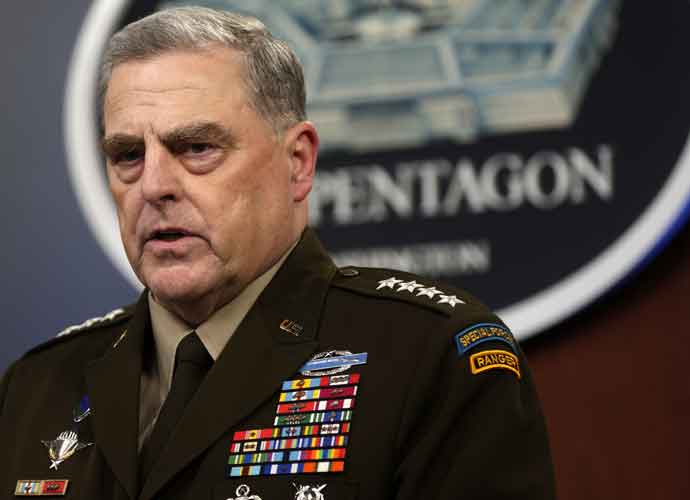

ARLINGTON, VIRGINIA - AUGUST 18: Chairman of the Joint Chiefs of Staff Army General Mark Milley participates in a news briefing at the Pentagon August 18, 2021 in Arlington, Virginia. U.S. Secretary of Defense Lloyd Austin and General Milley held a news briefing to discuss the current situation in Afghanistan after the Taliban took control of the country. (Photo by Alex Wong/Getty Images)
Gen. Mark Milley, the chairman of the Joint Chiefs of Staff, appeared in a House panel on Wednesday to answer questions from the Congress members about the Afghanistan withdrawal and the recent bombshell revelation about his phone call with a top Chinese military official.
Along with other top military officials in Biden administration, Defense Secretary Lloyd Austin and Gen. Kenneth McKenzie, Milley had some heated exchanges with the House Armed Services Committee.
The questions the officials received were mostly about the U.S. military’s evacuation in August, including the suicide bombing that killed 13 U.S. service members and the American drone strike that killed 10 Afghan civilians. The hearing comes a day after the officials testified before the Senate Armed Services Committee. During the Tuesday hearing, McKenzie and Milley both revealed that they advised President Joe Biden to leave 2,500 troops in Afghanistan.
“I won’t share my personal recommendation to the president, but I will give you my honest opinion, and my honest opinion and view shaped my recommendation. I recommended that we maintain 2,500 troops in Afghanistan. And I also recommended earlier in the fall of 2020 that we maintain 4,500 at that time. Those are my personal views,” McKenzie said Tuesday in response to the question from Sen. James Inhofe (R-Oklahoma).
Subscribe to our free weekly newsletter!
A week of political news in your in-box.
We find the news you need to know, so you don't have to.
Wednesday’s hearing was especially tough for Milley as Republicans on the Senate committee continuously attacked him over his phone call with the Gen. Li Zuocheng of China. According to the recent tell-all book Peril, Milley told Li that he would let China know first before the U.S. military were to launch an attack against them.
In response to the panels’ questions regarding this incident, Milley explained that the Chinese government “thought wrongly that the United States is going to attack them,” and that he was merely assuring the officials.
“I’m not going to tip off the enemy about what the United States is going to do in an actual plan. What I’m trying to do is persuade an adversary that is heavily armed that was clearly and unambiguously according to intelligence reports very nervous about our behavior and what was happening inside this country and they were concerned that we, President Trump was going to launch an attack. He was not going to launch an attack,” Milley told the House Armed Services Committee.
Milley also explained that his phone call was especially necessary since he knew that “President Trump had no intent to attack.”
“And it was my task to make sure I communicated that, and the purpose was to de-escalate,” he said.
Sen. Chris Murphy (D-Connecticut) has launched a new political action committee (PAC), the American Mobilization…
Brit Hume, the Fox News chief political analyst, contradicted President Donald Trump's statement to the…
FBI Director Kash Patel has revealed that his home was "swatted" last week. "As Director…
Commerce Secretary Howard Lutnick announced the launch of the $5 million "gold card" U.S. residency…
In a new study, nearly 50% of Tesla owners report their vehicles have been vandalized,…
President Donald Trump has ordered an investigation into whether allies of former President Joe Biden…